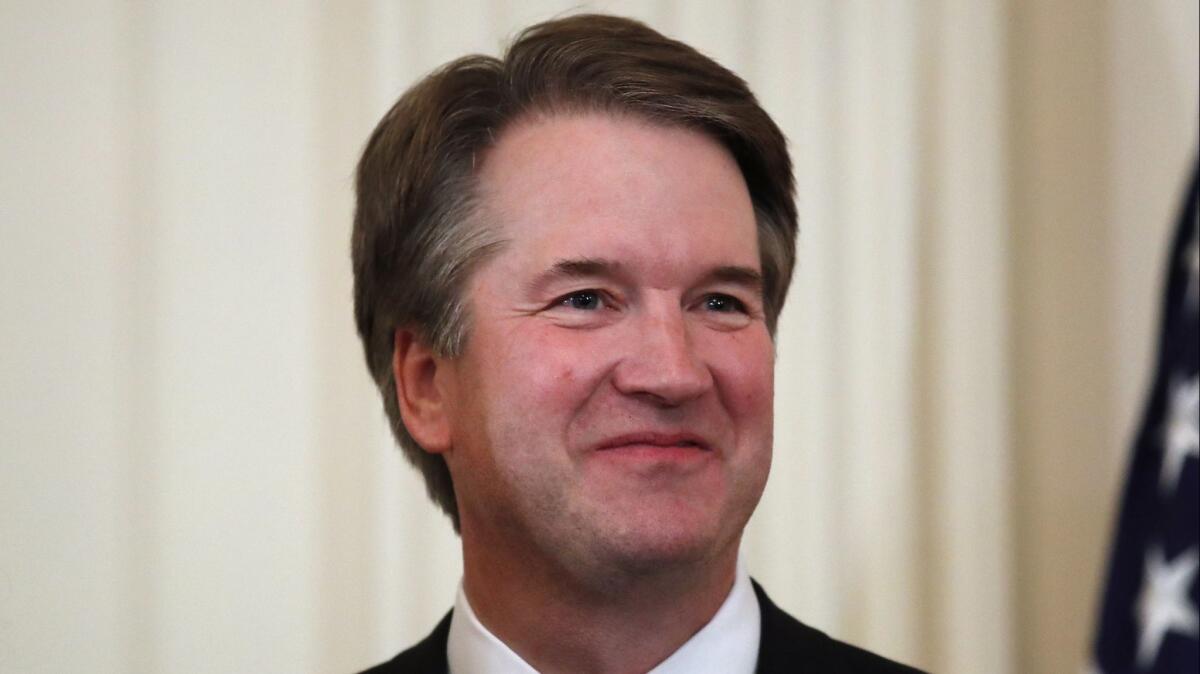Op-Ed: What Brett Kavanaugh could mean for the future of abortion, marriage equality and much more

After a buildup worthy of a master of reality TV, President Trump has nominated Judge Brett Kavanaugh for the Supreme Court vacancy created by Justice Anthony M. Kennedy’s retirement. This continues a run of almost 50 consecutive years when the court has had a majority of Republican appointees.
Many commentators will rush to cast this nomination solely in terms of what it means for the rights to abortion and to marriage equality for same-sex couples. Although those issues are important, Kavanaugh likely will have the deciding vote on many other issues that have a profound impact on people’s daily lives. He should be assessed on what he would bring to the court on all these issues.
Still, the starting point has to be abortion. Kennedy, the court’s primary swing justice for at least a dozen years, became increasingly antagonistic to Roe vs. Wade over the years. He never was willing to cast the fifth vote to overrule it directly, surely aware of the turmoil that would result. If Roe were overturned, abortion would dominate state politics — and state elections — across the country for the next several years. Kennedy valued continuity and gradualism; triggering that sort of upheaval was not in his nature.
It is difficult to find examples of...courageous, independent moves in Kavanaugh’s decisions.
If Kavanaugh is confirmed, he is unlikely to be similarly reticent. Of many very conservative judges around the country, he was among the handful that the Federalist Society short-listed and sent to Trump. What almost certainly made Kavanaugh (and the others picked by the society) stand out is that they gave the list-makers maximum confidence they would cast the decisive vote against Roe. Nobody should let the theater of confirmation hearings, or vague promises to respect precedent, obscure that fact.
Same-sex marriage is slightly more complicated. The court grounded its most important decisions protecting same-sex couples on the same right to privacy that underlies Roe. The most straightforward way to eliminate constitutional protection for the right to abortion is to reject or limit the right to privacy. Doing so would also remove the constitutional foundation for protecting same-sex couples. A decision against Roe implies that marriage equality too would be imperiled.
Kavanaugh’s judicial history bears on a set of cases about how courts enforce what is indisputably the law. For example, when a university broke federal privacy laws in disclosing confidential information to a state agency, a closely divided Supreme Court held that the injured student could not obtain redress. He could only wait and hope that the federal government would do something. With the Trump administration openly refusing to enforce laws and regulations with which it disagrees, refusing to allow victims their day in court is tantamount to repealing the law itself. In a similar case, Kavanaugh enthusiastically rejected a cook’s right to argue that he was fired in illegal retaliation for reporting health and safety violations. Again, the government could have pursued the question but not the individual, even though it meant the law went unenforced.
Enter the Fray: First takes on the news of the minute from L.A. Times Opinion »
Another set of cases Kavanaugh would likely decide concerns employers, credit card companies, and other big businesses and their clear obligations under the law or under their own contracts. To get around those obligations, employers and businesses require employees or customers to sign arbitration clauses. In theory, these provide an out-of-court means of resolving disputes. In practice, the arbitrators are handpicked by the companies’ trade associations, and the procedures are deliberately made so burdensome that people often cannot afford to press legitimate complaints. In several closely divided opinions, the Supreme Court has prevented states from protecting their residents against the abusive contract provisions. Similarly, in a case that came before him, Kavanaugh found in favor of the clauses or their outcomes.
Finally, as Donald Rumsfeld would say, there are the unknown unknowns. Every so often, the court is called upon to respond to sudden emergencies posing fundamental threats to our identity as a free and democratic country. When President Franklin D. Roosevelt interned more than 100,000 Japanese Americans without any evidence of disloyalty, when President Truman claimed a national emergency gave him the right to seize the steel industry, when President Nixon asserted the right to withhold incriminating tapes from a special prosecutor, and when President George W. Bush claimed the right to hold people indefinitely without any review of the basis, the Supreme Court was asked to intervene.
The court has not always distinguished itself in these situations. Especially crucial in these times are justices willing to act independently even at the cost of disappointing those who brought them to the court. It is difficult to find examples of such courageous, independent moves in Kavanaugh’s decisions. If he cannot point to some in the confirmation process, we should worry about his ability to perform the court’s vital role in a crisis, be it an updated version of one from our past or something completely new.
David A. Super is a professor of law at Georgetown University, where he studies constitutional law, administrative law and legislation.
Follow the Opinion section on Twitter @latimesopinionand Facebook
More to Read
A cure for the common opinion
Get thought-provoking perspectives with our weekly newsletter.
You may occasionally receive promotional content from the Los Angeles Times.










